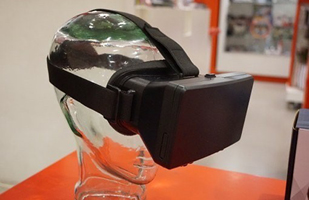Virtual Reality Helps Courts Shape Sober Realities

An app utilizing VR technology is helping justice-involved people in Franklin County cope with mental health and substance use issues.

An app utilizing VR technology is helping justice-involved people in Franklin County cope with mental health and substance use issues.
People with mental health and substance use issues often experience the need “to get away.” In Franklin County, courts are helping justice-involved individuals escape those pressures by sending them to a sunny beach… virtually.
Franklin County common pleas and municipal courts are piloting an app – “Anchored 2 Hope” – that harnesses virtual reality (VR) for therapy.
Participants don virtual reality goggles and earbuds to enter a very different world of “mindfulness” – a method of relieving stress and anxiety through calmness and awareness of one’s thoughts and feelings.
The therapy employs the meditative practices of visualization and guided imagery. For those dealing with dark thoughts, transcending to a safe space can restore calm and clarity, preventing emotional or psychological triggers that many times leads to relapse or destructive behavior.
The methods have been explored for decades in treating conditions such as depression and post-traumatic stress disorder (PTSD). As medical research on the impact of virtual reality to treat PTSD continues to grow, smaller studies have shown positive outcomes in the reduction of symptoms.
“I recently moved here from California and when my anxiety got bad and I thought about using, I would go to the beach, so the VR beach meditation is good for me,” said Benny T., who successfully completed his probation with Franklin County Municipal Court.
Along with a quiet beach, other simulated settings in the app – to soothe users – depict the Northern Lights or viewing Earth from space.
Currently, there are 461 Franklin County participants from various specialized dockets, including drug courts and veterans treatment courts.
The app helps courts maintain an essential connection with those in recovery and reminds participants that help is always available. For example, one feature summons licensed mental health professionals at any time, day or night.
“It enhances the resources and support that we provide to these individuals, and gives them a better chance for success as they work to rebuild their lives,” said Franklin County Common Pleas Judge Jaiza Page.
“Especially during the pandemic, I appreciate being able to provide a resource that is available 24/7 and offers an immediate connection to what our constituents may need,” said Franklin County Municipal Judge Jodi Thomas.
The app also supplies information about essential resources – food, housing, and job training – and structural support with email and calendar reminders of court dates and other important events.
Melinda Swan, the app’s creator and CEO of Lewis Center, Ohio-based Anchored2Hope, developed the software with the help of advisers, including judges, probation officers, and people actively using drugs or alcohol, or who are in recovery.
“The platform is led by therapeutic techniques and proven engagement strategies to guide people through the process of change," Swan said.
Along with the live components, the app provides aggregate data for court staff to see which features participants are using, allowing treatment teams and probation officers to get a better idea of arising issues.
After years of research to cultivate the app, its use as part of the Franklin County pilot arrived at an opportune time amid the pandemic. Many courts have been limited in how they’re able to assist justice-involved individuals during the public health restrictions – particularly those participating in specialized dockets.


